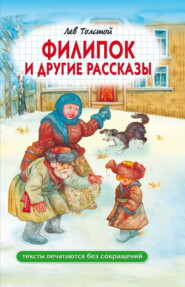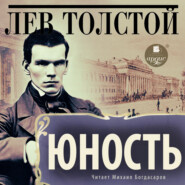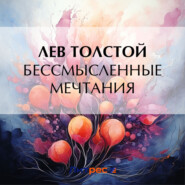По всем вопросам обращайтесь на: info@litportal.ru
(©) 2003-2025.
✖
War and Peace
Настройки чтения
Размер шрифта
Высота строк
Поля
This action was so unlike her usual composure and the fear depicted on Prince Vasíli’s face so out of keeping with his dignity that Pierre stopped and glanced inquiringly over his spectacles at his guide. Anna Mikháylovna evinced no surprise, she only smiled faintly and sighed, as if to say that this was no more than she had expected.
“Be a man, my friend. I will look after your interests,” said she in reply to his look, and went still faster along the passage.
Pierre could not make out what it was all about, and still less what “watching over his interests” meant, but he decided that all these things had to be. From the passage they went into a large, dimly lit room adjoining the count’s reception room. It was one of those sumptuous but cold apartments known to Pierre only from the front approach, but even in this room there now stood an empty bath, and water had been spilled on the carpet. They were met by a deacon with a censer and by a servant who passed out on tiptoe without heeding them. They went into the reception room familiar to Pierre, with two Italian windows opening into the conservatory, with its large bust and full length portrait of Catherine the Great. The same people were still sitting here in almost the same positions as before, whispering to one another. All became silent and turned to look at the pale tear-worn Anna Mikháylovna as she entered, and at the big stout figure of Pierre who, hanging his head, meekly followed her.
Anna Mikháylovna’s face expressed a consciousness that the decisive moment had arrived. With the air of a practical Petersburg lady she now, keeping Pierre close beside her, entered the room even more boldly than that afternoon. She felt that as she brought with her the person the dying man wished to see, her own admission was assured. Casting a rapid glance at all those in the room and noticing the count’s confessor there, she glided up to him with a sort of amble, not exactly bowing yet seeming to grow suddenly smaller, and respectfully received the blessing first of one and then of another priest.
“God be thanked that you are in time,” said she to one of the priests; “all we relatives have been in such anxiety. This young man is the count’s son,” she added more softly. “What a terrible moment!”
Having said this she went up to the doctor.
“Dear doctor,” said she, “this young man is the count’s son. Is there any hope?”
The doctor cast a rapid glance upwards and silently shrugged his shoulders. Anna Mikháylovna with just the same movement raised her shoulders and eyes, almost closing the latter, sighed, and moved away from the doctor to Pierre. To him, in a particularly respectful and tenderly sad voice, she said:
“Trust in His mercy!” and pointing out a small sofa for him to sit and wait for her, she went silently toward the door that everyone was watching and it creaked very slightly as she disappeared behind it.
Pierre, having made up his mind to obey his monitress implicitly, moved toward the sofa she had indicated. As soon as Anna Mikháylovna had disappeared he noticed that the eyes of all in the room turned to him with something more than curiosity and sympathy. He noticed that they whispered to one another, casting significant looks at him with a kind of awe and even servility. A deference such as he had never before received was shown him. A strange lady, the one who had been talking to the priests, rose and offered him her seat; an aide-de-camp picked up and returned a glove Pierre had dropped; the doctors became respectfully silent as he passed by, and moved to make way for him. At first Pierre wished to take another seat so as not to trouble the lady, and also to pick up the glove himself and to pass round the doctors who were not even in his way; but all at once he felt that this would not do, and that tonight he was a person obliged to perform some sort of awful rite which everyone expected of him, and that he was therefore bound to accept their services. He took the glove in silence from the aide-de-camp, and sat down in the lady’s chair, placing his huge hands symmetrically on his knees in the naïve attitude of an Egyptian statue, and decided in his own mind that all was as it should be, and that in order not to lose his head and do foolish things he must not act on his own ideas tonight, but must yield himself up entirely to the will of those who were guiding him.
Not two minutes had passed before Prince Vasíli with head erect majestically entered the room. He was wearing his long coat with three stars on his breast. He seemed to have grown thinner since the morning; his eyes seemed larger than usual when he glanced round and noticed Pierre. He went up to him, took his hand (a thing he never used to do), and drew it downwards as if wishing to ascertain whether it was firmly fixed on.
“Courage, courage, my friend! He has asked to see you. That is well!” and he turned to go.
But Pierre thought it necessary to ask: “How is …” and hesitated, not knowing whether it would be proper to call the dying man “the count,” yet ashamed to call him “father.”
“He had another stroke about half an hour ago. Courage, my friend …”
Pierre’s mind was in such a confused state that the word “stroke” suggested to him a blow from something. He looked at Prince Vasíli in perplexity, and only later grasped that a stroke was an attack of illness. Prince Vasíli said something to Lorrain in passing and went through the door on tiptoe. He could not walk well on tiptoe and his whole body jerked at each step. The eldest princess followed him, and the priests and deacons and some servants also went in at the door. Through that door was heard a noise of things being moved about, and at last Anna Mikháylovna, still with the same expression, pale but resolute in the discharge of duty, ran out and touching Pierre lightly on the arm said:
“The divine mercy is inexhaustible! Unction is about to be administered. Come.”
Pierre went in at the door, stepping on the soft carpet, and noticed that the strange lady, the aide-de-camp, and some of the servants, all followed him in, as if there were now no further need for permission to enter that room.
Chapter XXIII (#ulink_e6468b17-0b45-54dd-aa32-4c1106a70979)
Pierre well knew this large room divided by columns and an arch, its walls hung round with Persian carpets. The part of the room behind the columns, with a high silk-curtained mahogany bedstead on one side and on the other an immense case containing icons, was brightly illuminated with red light like a Russian church during evening service. Under the gleaming icons stood a long invalid chair, and in that chair on snowy-white smooth pillows, evidently freshly changed, Pierre saw—covered to the waist by a bright green quilt—the familiar, majestic figure of his father, Count Bezúkhov, with that gray mane of hair above his broad forehead which reminded one of a lion, and the deep characteristically noble wrinkles of his handsome, ruddy face. He lay just under the icons; his large thick hands outside the quilt. Into the right hand, which was lying palm downwards, a wax taper had been thrust between forefinger and thumb, and an old servant, bending over from behind the chair, held it in position. By the chair stood the priests, their long hair falling over their magnificent glittering vestments, with lighted tapers in their hands, slowly and solemnly conducting the service. A little behind them stood the two younger princesses holding handkerchiefs to their eyes, and just in front of them their eldest sister, Catiche, with a vicious and determined look steadily fixed on the icons, as though declaring to all that she could not answer for herself should she glance round. Anna Mikháylovna, with a meek, sorrowful, and all-forgiving expression on her face, stood by the door near the strange lady. Prince Vasíli in front of the door, near the invalid chair, a wax taper in his left hand, was leaning his left arm on the carved back of a velvet chair he had turned round for the purpose, and was crossing himself with his right hand, turning his eyes upward each time he touched his forehead. His face wore a calm look of piety and resignation to the will of God. “If you do not understand these sentiments,” he seemed to be saying, “so much the worse for you!”
Behind him stood the aide-de-camp, the doctors, and the menservants; the men and women had separated as in church. All were silently crossing themselves, and the reading of the church service, the subdued chanting of deep bass voices, and in the intervals sighs and the shuffling of feet were the only sounds that could be heard. Anna Mikháylovna, with an air of importance that showed that she felt she quite knew what she was about, went across the room to where Pierre was standing and gave him a taper. He lit it and, distracted by observing those around him, began crossing himself with the hand that held the taper.
Sophie, the rosy, laughter-loving, youngest princess with the mole, watched him. She smiled, hid her face in her handkerchief, and remained with it hidden for awhile; then looking up and seeing Pierre she again began to laugh. She evidently felt unable to look at him without laughing, but could not resist looking at him: so to be out of temptation she slipped quietly behind one of the columns. In the midst of the service the voices of the priests suddenly ceased, they whispered to one another, and the old servant who was holding the count’s hand got up and said something to the ladies. Anna Mikháylovna stepped forward and, stooping over the dying man, beckoned to Lorrain from behind her back. The French doctor held no taper; he was leaning against one of the columns in a respectful attitude implying that he, a foreigner, in spite of all differences of faith, understood the full importance of the rite now being performed and even approved of it. He now approached the sick man with the noiseless step of one in full vigor of life, with his delicate white fingers raised from the green quilt the hand that was free, and turning sideways felt the pulse and reflected a moment. The sick man was given something to drink, there was a stir around him, then the people resumed their places and the service continued. During this interval Pierre noticed that Prince Vasíli left the chair on which he had been leaning, and—with an air which intimated that he knew what he was about and if others did not understand him it was so much the worse for them—did not go up to the dying man, but passed by him, joined the eldest princess, and moved with her to the side of the room where stood the high bedstead with its silken hangings. On leaving the bed both Prince Vasíli and the princess passed out by a back door, but returned to their places one after the other before the service was concluded. Pierre paid no more attention to this occurrence than to the rest of what went on, having made up his mind once for all that what he saw happening around him that evening was in some way essential.
The chanting of the service ceased, and the voice of the priest was heard respectfully congratulating the dying man on having received the sacrament. The dying man lay as lifeless and immovable as before. Around him everyone began to stir: steps were audible and whispers, among which Anna Mikháylovna’s was the most distinct.
Pierre heard her say:
“Certainly he must be moved onto the bed; here it will be impossible …”
The sick man was so surrounded by doctors, princesses, and servants that Pierre could no longer see the reddish-yellow face with its gray mane—which, though he saw other faces as well, he had not lost sight of for a single moment during the whole service. He judged by the cautious movements of those who crowded round the invalid chair that they had lifted the dying man and were moving him.
“Catch hold of my arm or you’ll drop him!” he heard one of the servants say in a frightened whisper. “Catch hold from underneath. Here!” exclaimed different voices; and the heavy breathing of the bearers and the shuffling of their feet grew more hurried, as if the weight they were carrying were too much for them.
As the bearers, among whom was Anna Mikháylovna, passed the young man he caught a momentary glimpse between their heads and backs of the dying man’s high, stout, uncovered chest and powerful shoulders, raised by those who were holding him under the armpits, and of his gray, curly, leonine head. This head, with its remarkably broad brow and cheekbones, its handsome, sensual mouth, and its cold, majestic expression, was not disfigured by the approach of death. It was the same as Pierre remembered it three months before, when the count had sent him to Petersburg. But now this head was swaying helplessly with the uneven movements of the bearers, and the cold listless gaze fixed itself upon nothing.
After a few minutes’ bustle beside the high bedstead, those who had carried the sick man dispersed. Anna Mikháylovna touched Pierre’s hand and said, “Come.” Pierre went with her to the bed on which the sick man had been laid in a stately pose in keeping with the ceremony just completed. He lay with his head propped high on the pillows. His hands were symmetrically placed on the green silk quilt, the palms downward. When Pierre came up the count was gazing straight at him, but with a look the significance of which could not be understood by mortal man. Either this look meant nothing but that as long as one has eyes they must look somewhere, or it meant too much. Pierre hesitated, not knowing what to do, and glanced inquiringly at his guide. Anna Mikháylovna made a hurried sign with her eyes, glancing at the sick man’s hand and moving her lips as if to send it a kiss. Pierre, carefully stretching his neck so as not to touch the quilt, followed her suggestion and pressed his lips to the large boned, fleshy hand. Neither the hand nor a single muscle of the count’s face stirred. Once more Pierre looked questioningly at Anna Mikháylovna to see what he was to do next. Anna Mikháylovna with her eyes indicated a chair that stood beside the bed. Pierre obediently sat down, his eyes asking if he were doing right. Anna Mikháylovna nodded approvingly. Again Pierre fell into the naïvely symmetrical pose of an Egyptian statue, evidently distressed that his stout and clumsy body took up so much room and doing his utmost to look as small as possible. He looked at the count, who still gazed at the spot where Pierre’s face had been before he sat down. Anna Mikháylovna indicated by her attitude her consciousness of the pathetic importance of these last moments of meeting between the father and son. This lasted about two minutes, which to Pierre seemed an hour. Suddenly the broad muscles and lines of the count’s face began to twitch. The twitching increased, the handsome mouth was drawn to one side (only now did Pierre realize how near death his father was), and from that distorted mouth issued an indistinct, hoarse sound. Anna Mikháylovna looked attentively at the sick man’s eyes, trying to guess what he wanted; she pointed first to Pierre, then to some drink, then named Prince Vasíli in an inquiring whisper, then pointed to the quilt. The eyes and face of the sick man showed impatience. He made an effort to look at the servant who stood constantly at the head of the bed.
“Wants to turn on the other side,” whispered the servant, and got up to turn the count’s heavy body toward the wall.
Pierre rose to help him.
While the count was being turned over, one of his arms fell back helplessly and he made a fruitless effort to pull it forward. Whether he noticed the look of terror with which Pierre regarded that lifeless arm, or whether some other thought flitted across his dying brain, at any rate he glanced at the refractory arm, at Pierre’s terror-stricken face, and again at the arm, and on his face a feeble, piteous smile appeared, quite out of keeping with his features, that seemed to deride his own helplessness. At sight of this smile Pierre felt an unexpected quivering in his breast and a tickling in his nose, and tears dimmed his eyes. The sick man was turned on to his side with his face to the wall. He sighed.
“He is dozing,” said Anna Mikháylovna, observing that one of the princesses was coming to take her turn at watching. “Let us go.”
Pierre went out.
Chapter XXIV (#ulink_77e323f0-0321-5829-9b42-c7f708b3c16d)
There was now no one in the reception room except Prince Vasíli and the eldest princess, who were sitting under the portrait of Catherine the Great and talking eagerly. As soon as they saw Pierre and his companion they became silent, and Pierre thought he saw the princess hide something as she whispered:
“I can’t bear the sight of that woman.”
“Catiche has had tea served in the small drawing room,” said Prince Vasíli to Anna Mikháylovna. “Go and take something, my poor Anna Mikháylovna, or you will not hold out.”
To Pierre he said nothing, merely giving his arm a sympathetic squeeze below the shoulder. Pierre went with Anna Mikháylovna into the small drawing room.
“There is nothing so refreshing after a sleepless night as a cup of this delicious Russian tea,” Lorrain was saying with an air of restrained animation as he stood sipping tea from a delicate Chinese handleless cup before a table on which tea and a cold supper were laid in the small circular room. Around the table all who were at Count Bezúkhov’s house that night had gathered to fortify themselves. Pierre well remembered this small circular drawing room with its mirrors and little tables. During balls given at the house Pierre, who did not know how to dance, had liked sitting in this room to watch the ladies who, as they passed through in their ball dresses with diamonds and pearls on their bare shoulders, looked at themselves in the brilliantly lighted mirrors which repeated their reflections several times. Now this same room was dimly lighted by two candles. On one small table tea things and supper dishes stood in disorder, and in the middle of the night a motley throng of people sat there, not merrymaking, but somberly whispering, and betraying by every word and movement that they none of them forgot what was happening and what was about to happen in the bedroom. Pierre did not eat anything though he would very much have liked to. He looked inquiringly at his monitress and saw that she was again going on tiptoe to the reception room where they had left Prince Vasíli and the eldest princess. Pierre concluded that this also was essential, and after a short interval followed her. Anna Mikháylovna was standing beside the princess, and they were both speaking in excited whispers.
“Permit me, Princess, to know what is necessary and what is not necessary,” said the younger of the two speakers, evidently in the same state of excitement as when she had slammed the door of her room.
“But, my dear princess,” answered Anna Mikháylovna blandly but impressively, blocking the way to the bedroom and preventing the other from passing, “won’t this be too much for poor Uncle at a moment when he needs repose? Worldly conversation at a moment when his soul is already prepared …”
Prince Vasíli was seated in an easy chair in his familiar attitude, with one leg crossed high above the other. His cheeks, which were so flabby that they looked heavier below, were twitching violently; but he wore the air of a man little concerned in what the two ladies were saying.
“Come, my dear Anna Mikháylovna, let Catiche do as she pleases. You know how fond the count is of her.”
“I don’t even know what is in this paper,” said the younger of the two ladies, addressing Prince Vasíli and pointing to an inlaid portfolio she held in her hand. “All I know is that his real will is in his writing table, and this is a paper he has forgotten… .”
She tried to pass Anna Mikháylovna, but the latter sprang so as to bar her path.
“I know, my dear, kind princess,” said Anna Mikháylovna, seizing the portfolio so firmly that it was plain she would not let go easily. “Dear princess, I beg and implore you, have some pity on him! Je vous en conjure …”
The princess did not reply. Their efforts in the struggle for the portfolio were the only sounds audible, but it was evident that if the princess did speak, her words would not be flattering to Anna Mikháylovna. Though the latter held on tenaciously, her voice lost none of its honeyed firmness and softness.
“Pierre, my dear, come here. I think he will not be out of place in a family consultation; is it not so, Prince?”
“Why don’t you speak, cousin?” suddenly shrieked the princess so loud that those in the drawing room heard her and were startled. “Why do you remain silent when heaven knows who permits herself to interfere, making a scene on the very threshold of a dying man’s room? Intriguer!” she hissed viciously, and tugged with all her might at the portfolio.
But Anna Mikháylovna went forward a step or two to keep her hold on the portfolio, and changed her grip.

















